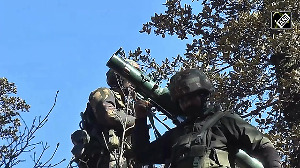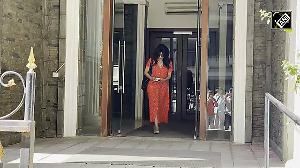Opposing unilateralism in international matters, Prime Minister Atal Bihari Vajpayee on Wednesday warned that terrorism inspired by religious extremism is threatening the entire civilised world and said Indo-Russian strategic partnership is a reliable factor in promoting peace, security and stability both in Asia and the world.
New Delhi and Moscow have a common interest in evolution of a multipolar world based on cooperative security order, he said addressing the Russian Academy of Sciences in Moscow on the second day of his visit to the country.
The prime minister appreciated Russia's 'consistent and strong support' to India's campaign against terrorism.
Vajpayee, who had a dinner meeting with President Vladimir Putin on Tuesday shortly after his arrival, said: "There are no divisive issues in our relationship. Neither India nor Russia perceives a threat from the strength of the other. Each sees a benefit for itself in the increased political and economic strength of the other."
The prime minister observed that this is best illustrated by Moscow's public and unambiguous support to India's permanent membership of UN Security Council.
Recalling Putin's address to Indian Parliament three years ago, Vajpayee said the Russian leader minced no words when he asserted that the same terrorist and extremist organisations were involved in terrorist acts from the Philippines to Kosovo and from Kashmir to Afghanistan to Chechnya.
Contending that during the past few years, dialogue and summit-level meetings have become more frequent and productive than ever before, Vajpayee said: "This has helped us evolve a comprehensive vision of Indo-Russian ties for the 21st century."
Both countries being multi-ethnic, pluralistic and democratic, the prime minister said intellectuals, scientists and all public figures have an important role to play in the fight against the forces of intolerance and violence.
"Our two countries have established a sound legal basis and a useful institutional mechanism for cooperation in the struggle against international terrorism," he said.
Vajpayee said bilateral business is the only area which had made less than desired progress. "It is also that area whose importance in international relations has grown tremendously in recent times. Both President Putin and I have been concerned that the volume and quality of our economic ties does not conform to the excellent level of our political relationship.
"We need to convert the extraordinary goodwill between India and Russia into a thriving, visible, vigorous and mutually beneficial economic relationship. In this endeavour, we need to show both innovation and a sense of urgency."
Maintaining that both countries are pursuing a similar goal to become economic powers, Vajpayee said one of the most efficient ways to achieve this goal would be through a synergy between scientific endeavours and business enterprises of the two countries.
Giving the example of successful bilateral cooperation in the pharmaceutical industry, the prime minister said: "I see no reason why such an example cannot be emulated in the widest possible range of opportunities that can be identified in the regular interaction between the academy and its partner institutions in India."
The 95-member strong business delegation from India which is now here could contribute in reaching this goal through cooperation with their Russian counterparts, he said and added: "Thus, I see a bright future for Indo-Russian relationship."





